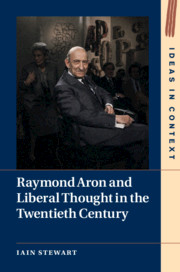Book contents
- Raymond Aron and Liberal Thought in the Twentieth Century
- Ideas in Context
- Raymond Aron and Liberal Thought in the Twentieth Century
- Copyright page
- Dedication
- Contents
- Acknowledgements
- A Note on Translations and References
- Introduction
- Chapter 1 Intellectual Politics and the Crisis of Democracy
- Chapter 2 History and Politics
- Chapter 3 Antitotalitarianism
- Chapter 4 The End of Ideology
- Chapter 5 Raymond Aron and the French Liberal Tradition
- Chapter 6 Raymond Aron and the Liberal Moment in Late Twentieth-Century French Thought
- Conclusion
- Select Bibliography
- Index
- Ideas in Context
Chapter 2 - History and Politics
Published online by Cambridge University Press: 18 October 2019
- Raymond Aron and Liberal Thought in the Twentieth Century
- Ideas in Context
- Raymond Aron and Liberal Thought in the Twentieth Century
- Copyright page
- Dedication
- Contents
- Acknowledgements
- A Note on Translations and References
- Introduction
- Chapter 1 Intellectual Politics and the Crisis of Democracy
- Chapter 2 History and Politics
- Chapter 3 Antitotalitarianism
- Chapter 4 The End of Ideology
- Chapter 5 Raymond Aron and the French Liberal Tradition
- Chapter 6 Raymond Aron and the Liberal Moment in Late Twentieth-Century French Thought
- Conclusion
- Select Bibliography
- Index
- Ideas in Context
Summary
This chapter offers a new interpretation of Raymond Aron’s doctoral thesis, Introduction à la philosophie de l’histoire (1938). Described by Aron as having established the basis of all his subsequent political thought, the Introduction contains a pluralist critique of Marx’s philosophy of history which doubles as a normative justification for political liberalism. Anticipating the ‘epistemology of doubt’ characteristic of later cold war liberalism, the book also served as the philosophical basis for Aron’s ethic of intellectual responsibility. Yet the extent to which the Introduction’s historical relativism undermines its ethical and normative arguments has been widely debated. Through an analysis of Aron’s previously under-explored interpretations of Dilthey and Heidegger, the chapter argues that scholarly disagreement on this issue reflects the Introduction’s ambiguous epistemological agnosticism. The chapter concludes with a discussion of the influence of the Introduction to the Philosophy of History on Jean-Paul Sartre's Critique of Dialectical Reason.
Keywords
- Type
- Chapter
- Information
- Publisher: Cambridge University PressPrint publication year: 2019

